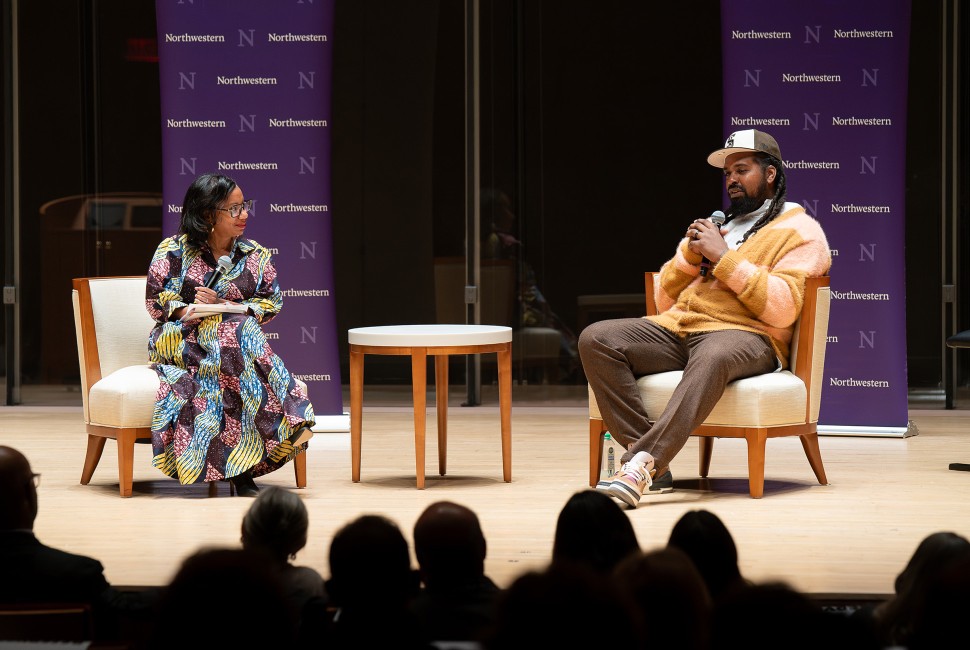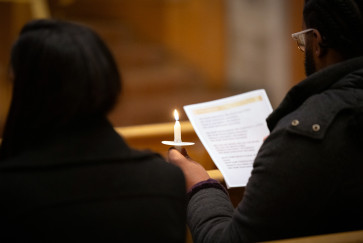Chicago historian Shermann “Dilla” Thomas and Medill School faculty member Natalie Moore discussed the Rev. Dr. Martin Luther King Jr.’s efforts to address poor housing conditions in Chicago’s Black neighborhoods during the keynote event on Jan. 21.
During the Great Migration, Black Americans relocated to the North, Midwest and West from the Jim Crow South in search of better economic and social conditions. In Chicago, African Americans were largely segregated to the city’s South and West Sides, a pattern that continues to define Chicago today.
When King arrived in Chicago the summer of 1966, the dilapidated housing in Black neighborhoods was a serious health and safety issue. For example, landlords refused to rebuild collapsed apartment stairwells, leaving families without a fire escape.
“In the 1960s, the number one cause of death for children was not shootings, it was fires and rodent bites because there was no second egress,” Thomas said.
From a North Lawndale high-rise he occupied with his family, King planned and led the Chicago Freedom Movement. Actions included a march through Cicero where he was struck in the head by a rock thrown by an angry mob of white residents.
“King had lived his whole life in legal segregation, but after arriving in Chicago, he thought Chicago was the most racist place he had ever been,” Thomas said.
Despite a promise by Mayor Richard J. Daley to meet King’s demands for fair housing, the mayor did not follow through. But King’s failure to get results in Chicago informed his negotiations with President Lyndon B. Johnson, and King succeeded in leaving Washington, D.C., with the terms for the Fair Housing Act of 1968, which protects people from discrimination when they are renting or buying a home.
For Thomas, he said attending segregated schools on Chicago’s South Side prevented him from being exposed to students of other races and ethnicities. He shared that King’s birth name was actually Michael Lewis King Jr., but King’s father — after returning to Atlanta from visiting Germany, the birthplace of Martin Luther, — decided to change his name and his son’s from Michael to Martin Luther, after the German Protestant leader.
“When you have an integrated spirit — you have people from multiple backgrounds pouring into you. You end up naming your baby boy after some white dude that lived hundreds of years before your time because you believe in what he believed in,” Thomas said. “That’s what we all should be striving for.”
Moore asked Thomas how he sees his work as a historian and content creator fitting into the scope of social justice.
He noted that during a trip he made to the International Holocaust Museum in Jerusalem, he learned the first thing to precede the Holocaust, before the violence began, was the banning of books.
“I realized what I’m doing is activism,” Thomas said. “Because if your kid ends up in a state where they ban AP Black history, they can still have access to YouTube and Instagram and can learn unfiltered, authentic history. If I don’t do anything but make history accessible to all — that is certainly a form of activism.”
Watch the complete keynote event on the Northwestern MLK website.
Other 2025 programming highlights included:
- “Unmaking Segregation: Bold Stories of Crossing the Line and Sparking Change in a Divided City.” Watch a recording of the panel discussion here.
- Panel conversation on redlining, segregation and urban renewal in Chicago hosted by Northwestern Pritzker School of Law and Feinberg School of Medicine.
- The 45th annual MLK Candlelight Vigil hosted by the Alpha Mu chapter of Alpha Phi Alpha, featuring the Honorable Michael Blake (’04), New York City mayoral candidate and former New York state representative.
- Eva Jefferson Day, a day of learning and activities for Family Focus Evanston youth.


